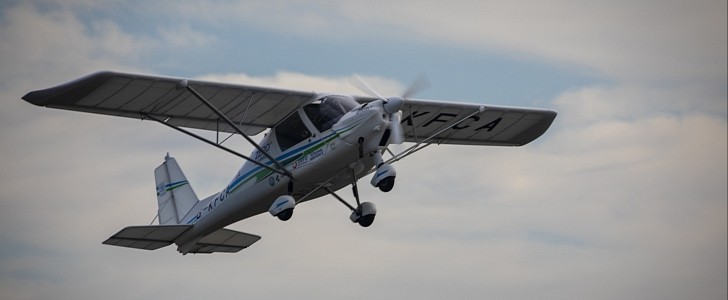Many innovations and bold plans for a green future have been showcased at this year’s Farnborough International Airshow. One of them is the Royal Air Force (RAF)’s announcement that it’s closer to certifying and ramping up the production of the synthetic fuel that helped it set a Guinness World Record last year.
In November 2021, RAF conducted a short flight in the UK with an Ikarus C42 microlight aircraft powered by 15 liters (3.9 gallons) of whole-blend synthetic gasoline. This week, the Ikarus was displayed at the Farnborough International Airshow, where RAF also announced its plans for fuel certification and future design blueprints. It hopes to build a squadron-scale fuel manufacturing facility as soon as possible.
Alternative fuel is a solution for green flight that can be implemented faster and easier compared to the development of entirely new electric propulsion systems. According to RAF, an alternative to liquid fuel is still needed for military high-performance aircraft, even though electric and hydrogen-electric solutions will be suitable for other military platforms.
RAF wants to become net zero by 2040, including operating a pioneering net zero airbase by 2025. Through its collaboration with Zero Petroleum, it will have access to an eco-friendly fuel that will become a huge step in this direction.
This synthetic fuel could be considered better than SAF (Sustainable Aviation Fuel) in terms of sustainability because it only requires water, air, and renewable energy, to be produced. SAF and other similar fuels are made for waste or biomass, which limits their availability. In turn, Zero Petroleum uses hydrogen extracted from water and CO2 from the atmosphere to convert them into synthetic fuel with the help of solar power or wind power.
Last year’s flight conducted by the RAF to demonstrate the efficiency of this synthetic fuel was the first of its kind to be recognized as a Guinness World Record.
Alternative fuel is a solution for green flight that can be implemented faster and easier compared to the development of entirely new electric propulsion systems. According to RAF, an alternative to liquid fuel is still needed for military high-performance aircraft, even though electric and hydrogen-electric solutions will be suitable for other military platforms.
RAF wants to become net zero by 2040, including operating a pioneering net zero airbase by 2025. Through its collaboration with Zero Petroleum, it will have access to an eco-friendly fuel that will become a huge step in this direction.
This synthetic fuel could be considered better than SAF (Sustainable Aviation Fuel) in terms of sustainability because it only requires water, air, and renewable energy, to be produced. SAF and other similar fuels are made for waste or biomass, which limits their availability. In turn, Zero Petroleum uses hydrogen extracted from water and CO2 from the atmosphere to convert them into synthetic fuel with the help of solar power or wind power.
Last year’s flight conducted by the RAF to demonstrate the efficiency of this synthetic fuel was the first of its kind to be recognized as a Guinness World Record.






